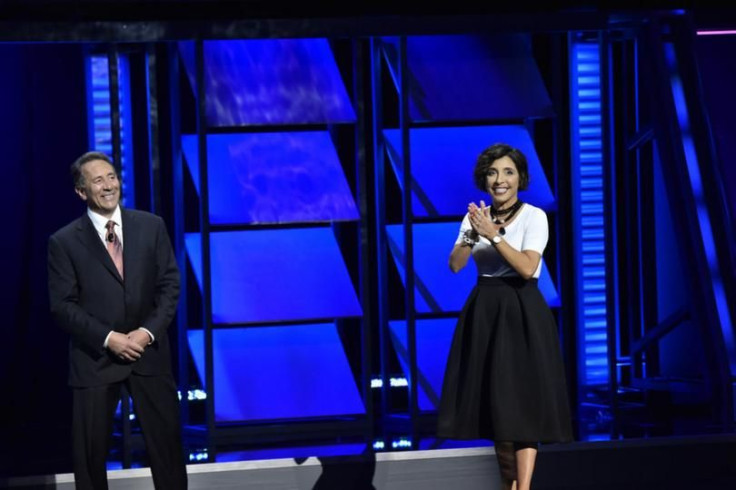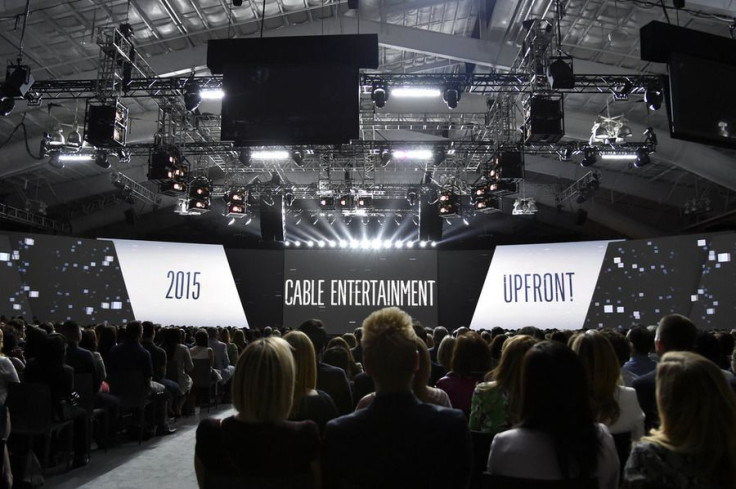What Are The Upfronts? The Biggest Week In TV Aims To Lock Up Billions In Advertising Dollars

Every May for more than 50 years now, TV networks have gathered masses of once and future advertisers in big, fancy New York City theaters to unveil their new programming and fall schedules. They ply Madison Avenue with alcohol, tuna tartare, and “sizzle” reels in the hope that this slightly absurd lavishness — it's not unheard of to spend more than $1 million on the whole shebang — will result in billions of dollars in promised ad buys.
These are the TV upfronts, a weeklong affair of parties and presentations put on by the networks to convince ad buyers and their clients that their fall lineups are worth committing their fall marketing budgets to, and 2016's spate of dog-and-pony shows starts Monday.
The upfronts are, essentially, a futures market, with advertisers betting on the success of the networks' shows. The networks promise the advertisers a certain number of eyeballs at a lower price than they'd be paying if they waited to see if the programs hit it big before buying the ad space.
If the networks don't deliver that number of eyeballs, they owe the advertiser either more ad space until the guarantee has been fulfilled or their money back. On the other hand, if the advertisers decide not to buy time in certain shows now, they run the risk of paying up to a 20 percent premium when the fall season starts.
The networks do this because it's good business, it's good for business, and it's just more efficient.
And so after the big events next week, media buyers and their clients will sit down and watch the pilots for the new shows, trying to figure out what kinds of people are most likely to watch each one; and their researchers will analyze the schedules, trying to figure out how many viewers the shows will draw in. They'll haggle over the summer about pricing and spot placements, and by the time Premiere Week rolls around in September, about $8.8 billion will have passed into the broadcast networks' coffers, according to estimates from investment bank Nomura.
It might seem like an antiquated way of doing things, and it is — networks were pitching themselves to advertisers almost as soon as TV was created, though the current timing and format of the upfronts didn't congeal until the early 1960s.
Initially, the upfronts were morning-long events during which executives like NBC's Brandon Tartikoff held forth while ad buyers brunched in such venues as the Hilton. "No one could work a room like Brandon," says Preston Beckman, a former NBC and Fox head of scheduling.
After spending the preceding week holed up in conference and hotel rooms, staying up all night piecing together the prime-time schedule (and, in later years, agonizing over scripting the presentations), the network execs would unveil their schedules, revealing the new and returning series for the fall.
The executives would take the buyers through the schedule, explaining the rationale behind each move, and even sometimes screen full-length pilots in the room. "You had to explain to these people why they should put their money behind your stuff," Beckman says.
In recent years, the unveiling of the schedule has become a little anticlimactic: The networks now give their schedules to reporters before the presentations, and show pickups, renewals and cancellations largely come out on the Thursday or Friday of the preceding week. (Back in the day, Beckman would occasionally deliberately mislead scoop-hungry reporters calling him up for an early peek at his schedules.)
But in broadcast's glory days, "it was a big f---ing deal," Beckman says, and so the presentations were worth it, even as they sometimes included some truly bizarre moments.
ALF, the puppet alien star of the NBC sitcom, appeared in the balcony of that network's upfront in 1986 to banter with Tartikoff. In 1991, Johnny Carson rocked a room full of hundreds of people by announcing, unbeknownst to anyone at the network, that the next season would be his last as host of "The Tonight Show." Former NBC chief of marketing Vince Manze, retired now, recalls writing an operetta for the cast of "Will & Grace" to perform.
"There was a lot more showmanship," Manze says.
This was before the rise of cable and streaming services, when true showmanship wasn't necessary at the upfronts. The broadcast networks were, for the most part, the only game in town, and for many years, there were only three of them. "Execs could have a personality," Beckman says. "You could have talent come out and say stuff that was unscripted."
The problem was, if a client was somehow rubbed the wrong way, that could sometimes hurt business. Security at the ABC presentation didn't initially let you in, or NBC gave the holder of McDonald's pursestrings crummy seats at Radio City Music Hall? Maybe take a little more of your budget over to CBS or Fox that year.

Fox's disastrous first upfront, in 1986, set that network back years, reputation-wise, says one buyer. It was held at the Central Park Boathouse, with the presentation in a tent outside the venue. A thunderstorm swept in. The tent started leaking. The projector shorted out, and executives canceled the rest of the presentation in favor of all 200-plus people moving inside the too-small building for the after-party. Buyers and clients had to search for their own belongings at coat check.
Fox eventually recovered from the blow to its attempt to be seen as a genuine broadcast network. But even now, the lesson stands, says the buyer who was at that first Fox upfront: Don't make the clients mad. Buyers make decisions primarily based on the strength of networks' shows and schedules, but an angry client is tough to overrule.
For years now, rumors abounded that the upfronts were on their way out, particularly as the country careened into a recession. But the fact is, even in this tech-drunk age where everyone wants to do everything via software, buyers and sellers say the human element still matters, and getting everyone together for a big ol' whoop-dee-doo is just easier.
"I was always trying to get them to cancel the presentation," Beckman says. "Just put all that money towards a giant party — that's all anyone really cares about anyway."
NBC actually did just that, in 2008 (Beckman decamped for Fox in 2000). Instead of the usual presentation and after-party, the network did roadshows where its salesmen went to the agencies and delivered more personalized pitches, then threw a large party it called "The NBC Universal Experience."
The next year, NBC was back in traditional mode, though the traditional party was gone, and Fox had usurped its usual slot at the beginning of the week.
"We always felt we had some control over whatever part of buying ad time is based on excitement," says Manze. "But you know, sometimes I think maybe we were just full of ourselves."
© Copyright IBTimes 2025. All rights reserved.






















